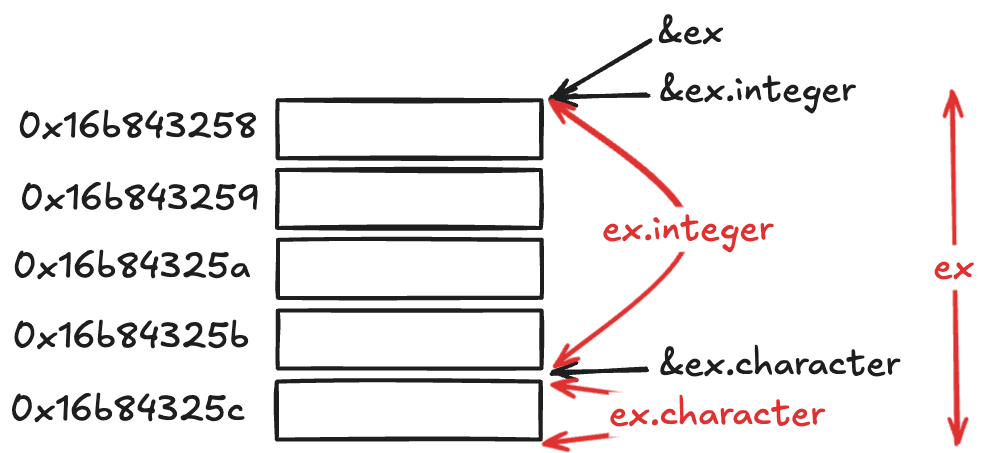란? §
- 구조체는 OPP 의 입장에서 보면 class 와 유사한 면이 있다.
- 여러 자료형의 필드들을 갖고있다는 점이나, 각 필드를
. 연산자로 접근하기 때문.
- 물론 C 는 OPP 언어가 아니기 때문에 class 는 아니다; 정확하게 말하면 구조체는 “Memory 공간을 해석하는 지침서” 정도가 된다.
- 예를 들어보자.
#include <stdio.h>
struct Example {
int integer;
char character;
};
int main() {
struct Example ex;
printf("&ex: %p\n", &ex);
printf("&ex.integer: %p\n", &ex.integer);
printf("&ex.character: %p\n", &ex.character);
}


- 즉, 저
ex 는 그냥 5byte 짜리 공간일 뿐이다. 이 공간을 struct Example 이라는 “지침서” 로 해석해서,
- 처음의 4byte 는
int 자료형의 공간이고, ex.integer 라는 symbol 로 접근할수 있으며
- 그 다음의 1byte 는
char 자료형의 공간이고 ex.character 라는 symbol 로 접근할 수 있다고 알려주는 것.
Variant §
- 그럼 이제 구조체를 사용하는 다양한 방법을 알아보자.
Struct pointer §
- 다른 변수들과 마찬가지로, 이놈도 pointer 에 동적할당해서 lifecycle 을 맘대로 제어할 수 있다.
- 다만, 이때는 각 필드에 접근할 때
. 가 아닌 -> 연산자를 사용한다.
- 아래 예시를 보자.
#include <stdio.h>
#include <stdlib.h>
struct Example {
int integer;
char character;
};
int main() {
struct Example* ex = malloc(sizeof(struct Example));
ex->integer = 1;
ex->character = 'A';
printf("ex.integer: %d\n", ex->integer);
printf("ex.character: %c\n", ex->character);
free(ex);
}

Typedef §
typedef 로 type alias 를 만들어서 매번 struct keyword 를 적어주는 불편함을 없앨 수 있다.
#include <stdio.h>
#include <stdlib.h>
typedef struct {
int integer;
char character;
} Example;
int main() {
Example* ex = malloc(sizeof(Example));
ex->integer = 1;
ex->character = 'A';
printf("ex.integer: %d\n", ex->integer);
printf("ex.character: %c\n", ex->character);
free(ex);
}
(Kinda) Method §
#include <stdio.h>
void print() {
printf("Printing\n");
}
struct Example{
int integer;
void (*printer)();
};
int main() {
struct Example ex;
ex.integer = 1;
ex.printer = &print;
printf("ex.integer: %d\n", ex.integer);
(*ex.printer)();
}




